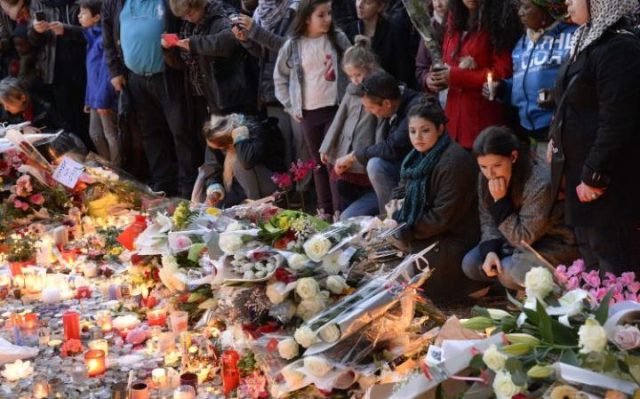
Paris attacks memorial Bataclan (image: http://www.telegraph.co.uk)
A heartrending clip showed a toddler in arms expressing his concerns and anxieties following the Paris disaster. He was told that the candles and flowers lining the bloodied streets of Paris were a sure sign that the French capital is protected from the bad guys, a concept the three-year could not understand.
Neither can we, except that it is a way of showing support to the afflicted and hope and encouragement to the inhabitants of terror-torn city.
But these words reflect a deeper problem, namely the heightened degree of existential angst that manifests itself in our children, starting from a very early age.
It is seen less dramatically but more significantly in the epidemic of depressive disorders among adolescents and even schoolchildren in the Western world today. It highlights a regrettable, albeit unintended failure, in our duties as parents to protect our children and shield them from harm, physical or mental.
Long gone are the days when we could freely roam the streets after school. Today, children huddle around electronic gizmos, subjecting themselves to influences over which we, as parents or grandparents, have lost practically all control.
No wonder one can hear complaints that we were much better off when we were worse off!
We, parents (and recently an increasing number of grandparents acting in loco parentis), are finding it difficult to steer our way between two conflicting pathways. On one hand, we do our best to encourage our children to get on, in school, in life, feeling vicarious pride in their achievements.
On the other, this philosophy essentially requires them to do better than anyone else, a process which inevitably injects into their minds the need for competition and achievement. The result is often stress resulting from inability to reach expectations.
It has also become very difficult to shield them from constant bombardment by news of local or worldwide disasters. Whether it is drownings at sea, beheadings of hostages, aircraft exploding in mid-air or other terrorist activities in our cities, there is no way we can shield them from this intrusive information which forms a daily dark cloud enveloping us all.
We have to rely on their much-touted resilience to hope that the scarring might be temporary and that they will grow into normal human beings.
Many no doubt will, but others might not. Our children are losing their innocence and we are losing our children.
Where to start? It would take a brave person to suggest that our media are responsible for a great deal of anxiety, through information which, although directed at adult members of society, often penetrates down to influence the younger ones as well.
It would be preposterous to suggest any degree of censorship in an age where this idea has become anathema.
And in any case it would be practically useless seeing that these days our children get their social priming, not from radio, television or newspapers, and least of all from their parents, but from social media (Facebook, Twitter, Instagram, You Tube) which are ubiquitous.
It is almost impossible to have any control over social media which has been responsible for an enormous amount of bullying and anxiety-producing attacks widely shared among children.
It is obvious that we seem to have no solution to this rapidly increasing problem. Perhaps this is a plea for the need of increased appreciation of the problem that often goes unrecognised.
[First published on www.timesofmalta.com on 6 December 2015]
